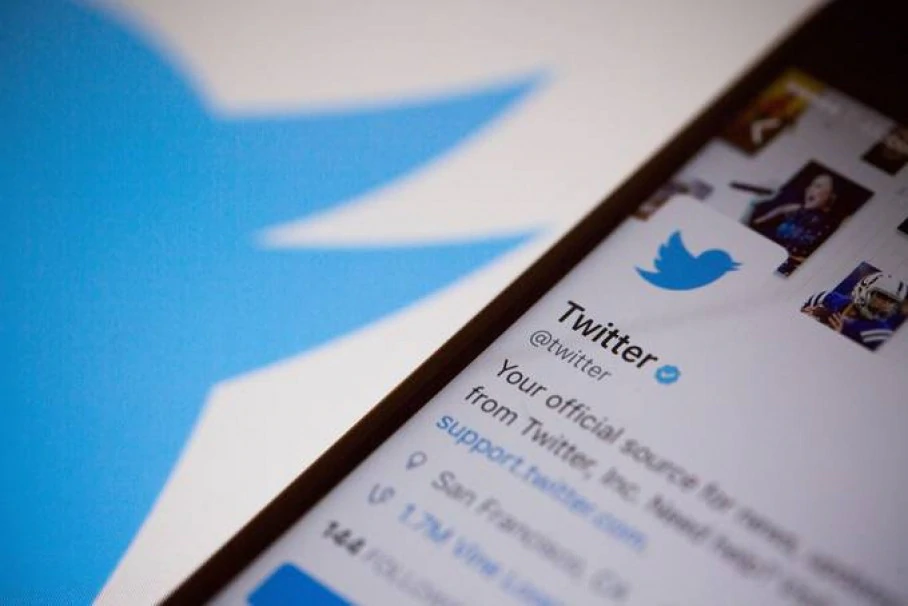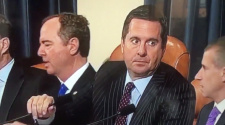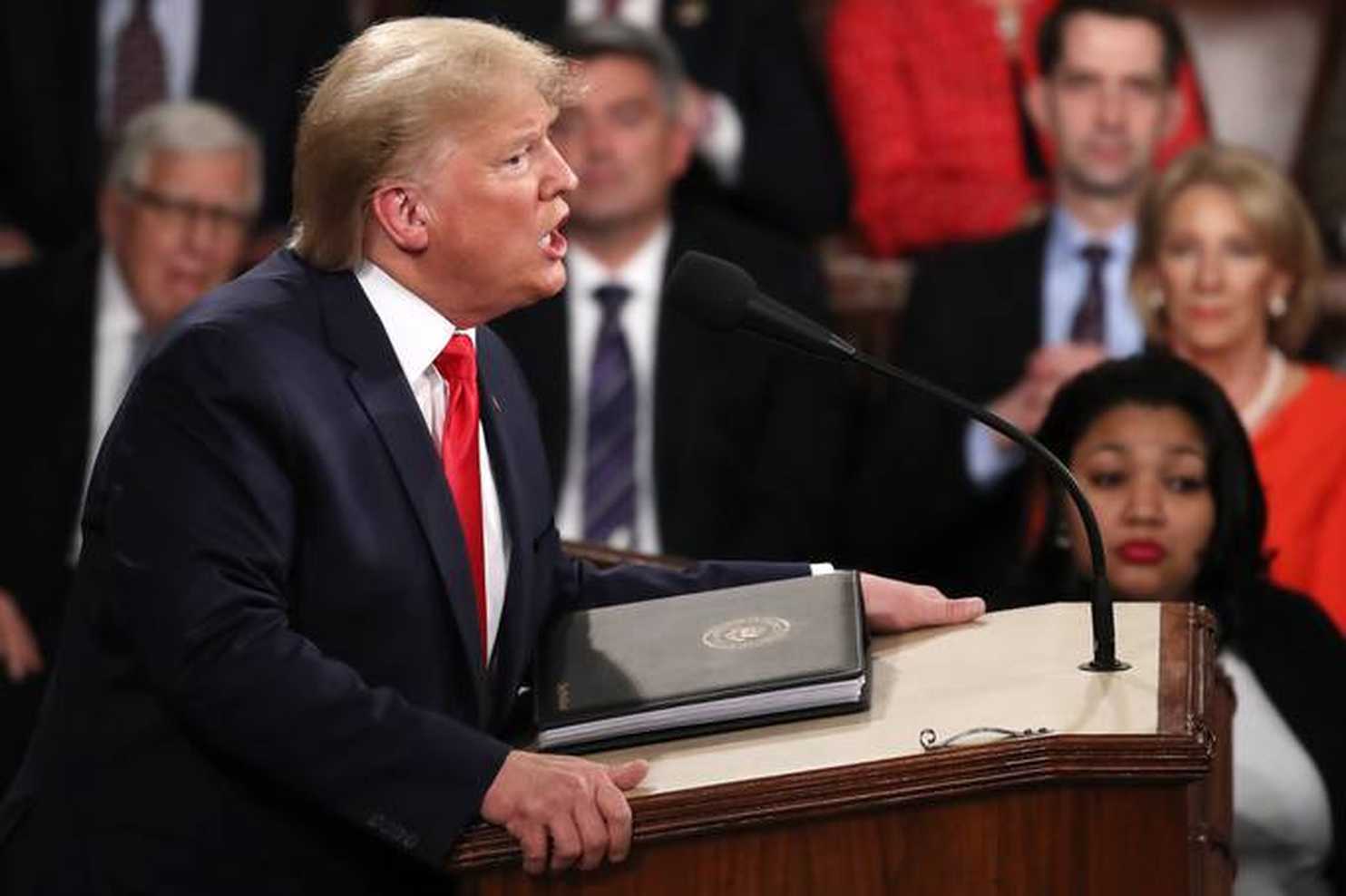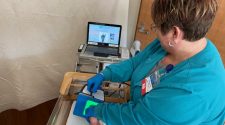President Donald Trump delivers the State of the Union address (Photo by Drew Angerer/Getty Images)
Ctrl + N
President Trump just showed how he plans to win the Internet during the 2020 elections.
Last night’s State of the Union address was expertly crafted for the social media era. He shook up the typically staid Washington affair with drama-filled moments and big reveals that seemed made for a Facebook News Feed — ranging from a service member’s touching reunion with his family to a surprise scholarship awarded to a Philadelphia fourth grader.
In one particularly unorthodox display, first lady Melania Trump awarded conservative news commentator Rush Limbaugh, who recently announced he was battling advanced lung cancer, with the Presidential Medal of Freedom. The talk show host’s stunned expression was the kind of made-for-meme moment that is sure to rally Trump’s base.
Rush Limbaugh’s reaction when Trump says he will award him the Presidential Medal of Freedom pic.twitter.com/NifAavJFZA
— Olivia Beavers (@Olivia_Beavers) February 5, 2020
The speech was a reminder that the most consistent trait of this often unpredictable president is Trump’s ability to go viral. The former reality TV star in the Oval Office has a flair for creating moments that can capture a Twitter, Facebook or Instagram audience more effectively than perhaps any other American politician.
That showman-like quality will pose a significant challenge for whoever becomes the Democratic nominee.
Trump’s speech appeared formulated to capture the attention of a country during a week otherwise dominated by the global outbreak of the deadly coronavirus, the conclusion of the heated Senate impeachment trial, and a chaotic Democratic caucus in Iowa.
The first sign that this wouldn’t be like any other State of the Union address was when Trump told Janiyah Davis, the fourth-grader, that she would receive an “opportunity scholarship.” He called Congress to pass legislation that would expand the availability of such scholarships, which Republicans say will give students more choice about where to attend school.
Trump is slick like Oprah with this #SOTU! You get a scholarship, you get a medal, you get a husband! pic.twitter.com/BGrZnChz1d
— Michael Lotfi (@MichaelLotfi) February 5, 2020
Later, Trump welcomed Sgt. Townsend Williams of North Carolina home from Afghanistan. Even Democrats stood and applauded as he walked into the chamber to be reunited with wife and hugged his two young children.
“Welcome home Sergeant Williams.”
Sergeant First Class Townsend Williams returns from deployment to surprise his family during State of the Union address.
Full video here: https://t.co/IqZgqQAMPl pic.twitter.com/tPRVZlcGvh
— CSPAN (@cspan) February 5, 2020
Trump also recognized Iain Lanphier, a student from Arizona with aspirations of joining the Space Force. As the crowd applauded, Trump revealed that he is the great-grandson of Charles McGee, one of the last surviving Tuskegee Airmen, the first black fighter pilots, who was sitting right next to him.
Oh my gosh Space Force Ian and his great grandfather Charles McGee of the Tuskegee Airmen!
Absolutely incredible moment.
(Reposted because the man deserves a picture with his eyes open) pic.twitter.com/Qb1CaxLMLx
— Matt Whitlock (@mattdizwhitlock) February 5, 2020
Initialized Capital managing partner and Reddit founder Alexis Ohanian said the bold strategy appeared to be paying off:
(it’s working)
— Alexis Ohanian Sr. 🚀 (@alexisohanian) February 5, 2020
The unconventional speech from Trump stood in stark contrast to the Democrats’ responses, delivered by Michigan Gov. Gretchen Whitmer, and Rep. Veronica Escobar (D-Texas) in Spanish. M.G. Siegler, a general partner at the venture capital firm GV, said that the Democrats’ response is not keeping up with the evolving game:
That Democrat response would have been fine in the 2000s. Or the 1990s. Or the 1980s. Etc. But here it feels like bringing a wet noodle to a gun fight at a clown show. Not gonna cut it. Love it or loathe it, it’s a different game and time. #SOTU
— M.G. Siegler (@mgsiegler) February 5, 2020
Democrats were quick to point out some of the president’s most divisive and exaggerated claims — and House Speaker Nancy Pelosi (D-Calif.) had her own dramatic flair. By tearing up her copy of Trump’s State of the Union speech, a move that highlighted the divisive year in Washington politics, she scored her own viral moment:
WATCH: Nancy Pelosi rips up a copy of President Trump’s #SOTU right after he finishes his address. https://t.co/is8UBLvZFO pic.twitter.com/vWum0NO09P
— CBS News (@CBSNews) February 5, 2020
The White House clapped back on Twitter:
Speaker Pelosi just ripped up:
One of our last surviving Tuskegee Airmen.
The survival of a child born at 21 weeks.
The mourning families of Rocky Jones and Kayla Mueller.
A service member’s reunion with his family.
That’s her legacy.
— The White House (@WhiteHouse) February 5, 2020
BITS, NIBBLES AND BYTES
BITS: Liberal tech firm Shadow claimed it would revolutionize Democrats’ digital campaigning playbook. Instead the staggering failures of its vote-counting app during the Iowa caucuses Monday night undermined confidence in the party’s tech ambitions and prompted pointed questions about why Iowa Democratic Party officials chose it in the first place, my colleagues Tony Romm, Neena Satija and Drew Harwell report.
Shadow yesterday apologized for the delays in reporting election results, noting that voting was not compromised:
We sincerely regret the delay in the reporting of the results of last night’s Iowa caucuses and the uncertainty it has caused to the candidates, their campaigns, and Democratic caucus-goers.
— Shadow, Inc. (@ShadowIncHQ) February 4, 2020
The Democratic National Committee called for the company to provide a full account of what went wrong, adding it would no longer be used for the Nevada caucuses or any other primaries.
New, from DNC: “It is clear that the app in question did not function adequately. It will not be used in Nevada or anywhere else during the primary election process. The technology vendor must provide absolute transparent accounting of what went wrong.”
— Tony Romm (@TonyRomm) February 5, 2020
Members of Congress and computer experts who raised concerns about the app for weeks leading up to the caucuses were also kept in the dark by party leaders about its specifics, my colleagues report.
The DNC’s top cybersecurity official also warned Iowa Democrats, the Wall Street Journal’s Dustin Volz reported:
MORE WARNINGS IGNORED: Bob Lord, the DNC’s cybersecurity chief, also directly urged Iowa Dems to drop plans to use the Shadow app, an overture that was ignored, according to people familiar with the matter. https://t.co/VFldZ5f3Dd
— Dustin Volz (@dnvolz) February 5, 2020
Questions remain about the relationship between Shadow and the Democratic Party. Shadow originated as Groundbase, a texting tool used by Democrats during the 2018 midterms. Liberal group Acronym, acquired Groundbase in January 2019.
Yet after the app malfunction, Acronym sought to distance itself from Shadow, saying the teams for the two organizations were entirely separate. Officials from the Democratic National Committee did not respond to questions from my colleagues about their role in Iowa Democrats’ decision to use Shadow. State party leaders also did not explain the relationship.

The Twitter Inc. logo (Michael Nagle/Bloomberg)
NIBBLES: Twitter is cracking down on doctored images and videos, announcing yesterday that it would start to label or remove deceptively edited media that could cause harm. The global policy will even apply to manipulated media shared by politicians, even though Twitter has traditionally taken a more hands-off approach to policing their posts due to concerns about their news value.
Twitter expects to roll out the policy next month, the latest sign that tech companies are cracking down on potentially misleading content during the heated 2020 election season. In order to draw a line between content intended to deceive and satire, the company says it plans to consider the context in which the doctored photo or video appears, such as the text accompanying it.
“The synthetic and manipulated media policy that we’re announcing today is one part of our holistic approach to proactively protecting the conversation on Twitter,” said Yoel Roth, Twitter’s head of site integrity, on a call with reporters.
Under the new policy, Twitter would take action against doctored videos that have recently gone viral. For instance, the company would label the recent video of Pelosi that was slowed down to make the House Speaker’s speech appear slurred. The company may have taken down individual tweets with the video, depending on context.
The company will take down manipulated photos and videos that are likely to cause harm, including threats to physical safety, the risk of civil unrest and threats to privacy. Twitter has already been taking action against manipulated media on its platform under policies. For instance, the most common doctored media on Twitter is nonconsensual nudity, which the company already takes down under existing policies.
The company has been working on the policy for months, soliciting feedback from users, civil groups and academics, company officials said on a call yesterday.

An employee works in the customer service center inside the Huawei Technologies Co. store Photographer: Geert Vanden Wijngaert/Bloomberg
BYTES: The White House is working with companies including Microsoft, Dell and AT&T to create advanced 5G software — and limit the dominance of China’s Huawei, the Wall Street Journal’s Bob Davis and Drew FitzGerald write.
The initiative would expand on efforts by some U.S. telecom and technology companies “to agree on common engineering standards that would allow 5G software developers to run code on machines that come from nearly any hardware manufacturer,” Bob and Drew write. That could make the U.S. less reliant on Huawei equipment.
“The big-picture concept is to have all of the U.S. 5G architecture and infrastructure done by American firms, principally,” White House economic adviser Larry Kudlow told the Journal in an interview. “That also could include Nokia and Ericsson because they have big U.S. presences.”
The push comes as the U.S. government increasingly warns about Huawei’s links to the Chinese military, raising concerns that its products pose a national security risk. Huawei has denied such links and claims it works independently of the Chinese government.
Dell founder Michael Dell was a strong backer of the initiative, especially following signs that software will play a greater role in 5G rollout, Kudlow told the Journal.
““Dell and Microsoft are now moving very rapidly to develop software and cloud capabilities that will, in fact, replace a lot of the equipment,” Kudlow said. “To quote Michael Dell, ‘Software is eating the hardware in 5G.’”
PUBLIC CLOUD
— Tech news from the public sector:

The U.S. Justice Department has reached out to app developers as part of its investigation into Apple Inc (AAPL.O), one of the four big tech companies being probed for alleged anti-competitive behavior, according one of the developers and another person familiar with the investigation.
Reuters
PRIVATE CLOUD
— Tech news from the private sector:
#TRENDING
— Tech news generating buzz around the Web:
CHECK-INS
— Today:
- Federal Trade Commissioners Noah Joshua Phillips and Rebecca Kelly Slaughter will address current technology policy issues during a panel conversation hosted by the Technology Policy Institute Wednesday at 10 a.m.
- New America will host an event on “Kickstarting the Digital Heartland” from 12 p.m. to 2 p.m.
- The House Energy and Commerce Oversight and Investigations Subcommittee will hold a hearing “Vaping in America: E-Cigarette Manufacturers’ Impact on Public Health.” hearing will be held at 10:30 a.m.
— Coming up:
- The House Homeland Security Committee will hold a hearing on DHS’s use of facial recognition and other biometric technologies on Thursday.
- The Future of Privacy Forum will host its 10th Annual Privacy Papers for Policymakers featuring a keynote speech by FTC Commissioner Christine S. Wilson on Thursday at 5:30 p.m.
- Georgetown Law’s Institute for Technology Law & Policy in partnership with the Georgetown Law Technology Review will co-host a daylong conference on “Election Integrity in the Networked Information Era on Friday from 9 a.m. to 5 p.m.
- The House Energy and Commerce committee will host a hearing “Autonomous Vehicles: Promises and Challenges of Evolving Automotive Technologies” Tuesday at 10am
- The Department of Justice will hold a public workshop in Washington, D.C. on Feb. 19, 2020, titled “Section 230 – Nurturing Innovation or Fostering Unaccountability”
- Silicon Flatirons will host its “Technology Optimism and Pessimism” conference Feb. 9 and 10 at the University of Colorado Law School in Boulder. Speakers include Federal Communications Commissioner Michael O’Rielly and Federal Trade Commissioner Rohit Chopra.
- Mobile World Congress takes place Feb. 24 to 27 in Barcelona.
















